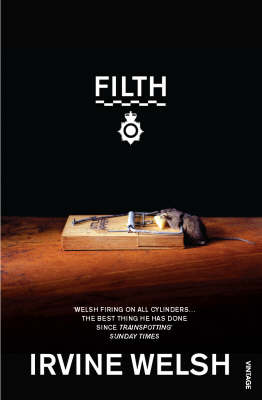Where to begin with this. Well, Irvine Welsh certainly has a distinctive narrative voice: the words and dialect of the novel not so much whisper that it is by the author as shout loudly that he is responsible for it. Secondly, if you take the grimmest parts of 'Trainspotting' and times them by ten, you get roughly to the point that 'Filth' is at.
The narrator of the novel is D.S. Bruce Robertson, angling for promotion. He has two major difficulties in his life: a race-aggravated murder that he is finding difficult to get to the bottom of and a tapeworm and eczema-ravaged anus which Welsh does not hold back in describing. In fact, the tapeworm is given his own narrative to accompany and at times push Robertson's words off the page.
The tapeworm is shown on the left. The 'Light' page is from 'The Acid House.'
Bruce Robertson is, undoubtedly, a terrible human being. Nobody escapes his wrath: black people ('coons'), Indian people ('wogs') homosexuals ('queers'), Hibs fans, women ('dyke'/'what she needs is a good seeing to'), Liverpool fans for grieving the recent Hillsborough disaster, prostitutes and colleagues. He schemes and snarls his way through the narrative. Another commentator on the novel, an American, said that it was not the Scottish vernacular and regular use of rhyming slang that made it difficult to read, but the sheer nastiness of Robertson. If that's not enough, we get rather grotesque imagery of Robertson scratching his eczema on his genitals with bacon fat underneath his fingernails. 'Filth' indeed.
Only at one point do we see any compassion in him, when he tries to save a man with a heart problem in the street and fleetingly sees his wife and son after the incident. Is it enough for redemption? I would suggest not.
Despite his faults, he is utterly compelling. His Machiavellian manipulation of his colleagues to work his way to the top make his Shakespearean compatriot look as sinister as a My Little Pony. As the novel progresses, we learn more about his childhood (courtesy of the tapeworm), his drug addiction and his relationship with Carole. There are even disturbing allusions made about his daughter. Compelling, yet a man to be kept at arm's length.
Key quotations
"That's the beauty aboot being polis: it doesnae really matter whether or not everybody hates you, as long as they're civil tae your face and can put up a good front. You can only live in the world you ken. The rest is just wishful thinking or paranoia."
"Why did I join the force? I repeat, - Oh I'd have to say that it was due to police oppression. I'd witnessed it within my own community and decided that it was something I wanted to be part of, I smile."
Other thoughts
- I asked Penny if she wanted to watch the film adaptation of this. "Why would I want to watch an evil man do evil things and [massive ending of the novel spoiler]?" Good point, well made.
- I thought this novel was excellent. A quick scan of the papers suggest that some reviewers thought that Robertson was unoriginal in terms of a self-loathing Scotsman and his evil scheming ways. Can't please everybody I guess, but come on! I think they read it with their knickers in a twist. Even if Scottish characters have the tendency to be somewhat 'glass half empty' folk, not many are written in Welsh's style. Completely original.
- I know one of the main criticisms of Welsh is that he's a one-trick pony. Still, after reading this and 'Trainspotting' I'm keen to read at least one or two more. Which others should I go for? Porno? Skag Boys? If anybody is a connoisseur of his novels, please advise. It'll take me a little time to get to reading it mind - I need a bit of a break after this onslaught!












